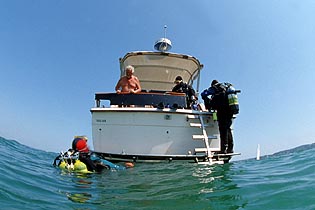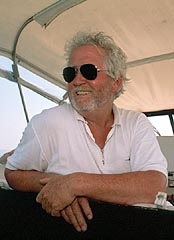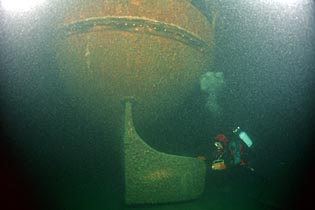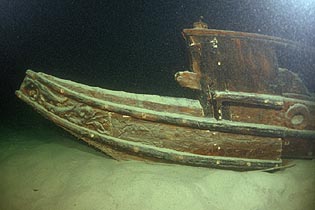Diving the "Jura" Wreck,
Lake Constance
A photo report about a diving
adventure to one of the most famous wrecks in fresh water in
Europe. But what damage happened recently on the wreck? What
should divers do to save the wreck?
Text and photos by
Jerome Konen
(Trip from 22 - 24 June 2002)
 |
| Ready for diving |
Slowly we go down along the anchor line, both of us, Paul
and myself, we are mentally going through the details of our
photo session again. The descent is terribly slowly as my
photo housing equipment slows down my progression due to its
volume. I start deploying the two strobes not to lose to much
time on the bottom as the air consumption will be increased
and the bottom time is highly reduced.
After 25m descending I begin to see the contours of the
wreck but deeper we go, less ambient light is visible and we
have to switch on the torches. Arriving on top of the debris
we immediately begin to orient ourselves upon the wreck and we
are heading for the the stern of this sinked paddle steamer.
In fact it's one of the most famous wrecks in fresh water in
Europe.
 |
| Helmut Steiner,
the skipper |
Helmut Steiner, the skipper let us go as the first group for
having best conditions in terms of visibility, advantage of a
photographer. I'm still impressed by the precision, he
navigated his boat to the wreck without GPS, only by cross
bearing. Hats off to him for his experience!
The collision
During the 12 February 1864, the "Jura", the
wooden flat-decked passenger paddle steamer collided in dense
fog with the Swiss ship "Stadt Zürich" and sank
minutes later near Bottighofen on the Swiss side of the
Bodensee (Lake Constance). There was one loss of life of a
crew member in this tragedy. All passengers have been rescued
on the other vessel that was almost undamaged.
Now the wreck is lying in 38m upright on the bottom. Due to
the dark and extremly cold water (5°C) down in the lake,
the wreck is well-preserved. Although I have observed quite a
lot of damage done by careless divers and wreck looters over
the last years because this site has become very popular among
divers. Some lower deck structures have collapsed as well as
the impressive funnel. So far, despite this desolate
situation, no legal protection has been launched for this
wreck.
 |
| The lavatory |
The first dive
While diving along the deck, I start taking some pictures,
let Paul bring himself in a right position in the scenery as
we had fully discussed previously during our briefing. I can't
leave for the stern without taking some pictures as well of
the lavatory visible through the widely open door of one of
the two paddle housings that are together with the small
bridge and the stairways, the only superstructures on deck.
Arriving finally at the stern I notice the little bottom
time left for the final pictures. Quickly we pass besides the
steering wheel to continue the descent along the rounded
stern. I'm quite astonished by the enormous rudder I haven't
had that big in my mind. Even with the fisheye lens I have
difficulties framing the whole stern with Paul included as a
diver. The reduced visibility of about 5-6m does not allow a
huge distance between the object and the lens. After the
shooting, the ascent required some deco-stops before we get on
the boat again.
 |
| Diving above the
deck to the stern |
|
|
After collecting all the other divers as well, we cruise to
Konstanz (Constance) for having some lunch at the "Biergarten"
in the harbour.
The second dive
Back on the boat after a long surface deco-stop our skipper
set course again for the "Jura". As Helmut had
marked the anker line with a buoy, finding back the position
of the wreck is an easy task.
Again we dive as first group, thanks again to Helmut. We are
interested now more in the front part, the wonderfully
decorated bow of this wooden wreck. While approaching, the
excellent preserved windlass appears out of the darkness in
the beam of our lights and in front the beautiful carving on
the top of the bow.
 |
| Around the bow
and lower deck |
|
|
With enough air and bottom time left, we dive back to the
middle part of the wreck trying to go lower deck, into the
passengers' room, but very carefully without too much fin
strokes avoiding to swirl up sediment from the floor and the
planks as this may be very dangerous by bringing the
visibility to zero and the immediate way out is blocked.
Preservation required
Back on the boat, we are all glad about the excellent dives
but at the same time we are aware of the need for preservation
for this beautiful wreck. But only considerately diving can
save this wreck from further damage and keep it as the one of
the most famous and interesting wrecks accessible in a lake. |